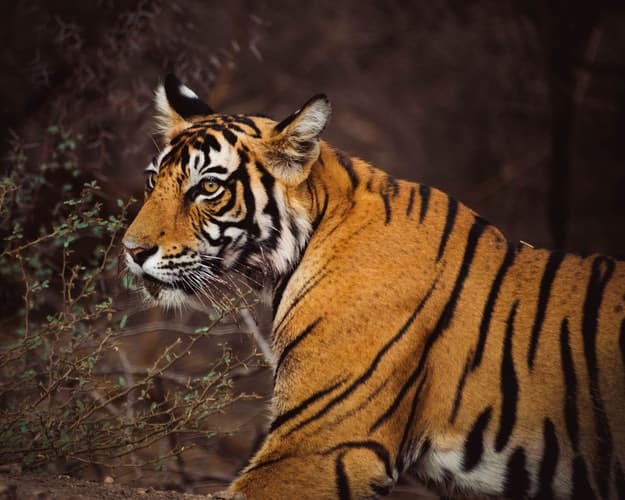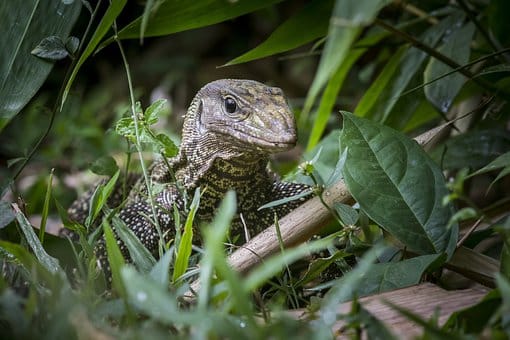Looking for the Top 10 Animals and Wildlife in Vietnam?
Vietnam stands out as one of Asia‘s most ecologically varied nations. Its diverse landscapes, including coastlines, caves, mountains, swamps, rivers, and tropical forests, offer vital habitats for a wide range of animals and wildlife. However, the country’s natural fauna faces significant threats due to habitat destruction and illegal poaching.

So why should you travel to Vietnam? It is not only a safe tourist destination but also brandishes magnificent scenery with a deep, rich culture.
You can read the entire article or jump to any section.
Key points
| Wildlife Species | Key Points |
|---|---|
| Asian Elephants | – Largest land mammal in Asia – Inhabit various habitats in 13 range countries – Few wild elephants left in Vietnam |
| Asiatic Black Bears | – Also known as sun/moon bears – Rescued and rehabilitated at Tam Dao Bear Sanctuary in Vietnam |
| Indochinese Tigers | – Endangered species found in Greater Mekong region – Low population due to poaching and habitat loss |
| Indochinese Leopards | – Rare outside protected areas, threatened by habitat loss and poaching |
| Monkeys | – Various leaf-eating monkey species in Vietnam, including gibbons and langurs |
| Pygmy Slow Loris | – Nocturnal primates found in Vietnam, Laos, Cambodia, and China – Venomous and reside in various forests |
| Pangolins | – Sunda and Chinese pangolin species in Vietnam – Critically endangered due to poaching and trade |
| Crocodiles | – Siamese and saltwater crocodiles in Vietnam – Siamese crocodiles endangered |
| Spinner Dolphin | – Acrobatic dolphins known for leaping and spinning in the air |
| Asian Water Monitor | – Giant lizard native to South and Southeast Asia – Common near water bodies |
About Vietnam
Vietnam boasts an array of religious and spiritual sites, including an impressive collection of temples, shrines, pagodas, and monasteries. These captivating buildings encompass a variety of religious traditions, from Hindu shrines to Buddhist monasteries.
Vietnam features 30 national parks scattered from the north to the south, encompassing areas from the coast to the border regions. Significant efforts in terms of time and financial investment have been dedicated to forest regeneration and biodiversity protection, particularly in response to the environmental damage incurred during the 1960s and 70s.
#1 Asian Elephants

The Asian elephant, recognized as the largest terrestrial mammal in Asia, resides in a range of habitats, from dry forests to wetlands and grasslands in 13 range countries spanning South and Southeast Asia. Asian elephants are found in isolated pockets of India and Southeast Asia, including Sumatra and Borneo.
The Asian elephant, recognized as the largest terrestrial mammal in Asia, resides in a range of habitats, from dry forests to wetlands and grasslands.
Where to see wildlife in Vietnam: Elephants
While there were once thousands of wild elephants in Vietnam, experts from Animals Asia say only 114 left in the country. Despite the small wild elephant population, the human-elephant conflict is a severe and ongoing problem in Vietnam. There are five groups of wild elephants, with the largest population in Yok Don National Park (in Dak Lak Province), an area of 100,000 hectares.
Elephant capture and training have been debated in the tourism industry,. Still, Yok Don National Park offers a genuinely ethical experience to encounter elephants in their natural habitat within a respectful range.
#2 Asiatic Black Bears ( Sun/ Moon Bears)

Found from southern China to eastern India and as far south as Indonesia, sun bears, often referred to as Malayan sun bears, derive their name from the distinctive, sun-like marking on their chests. The Sun Bear is the smallest, least well-known, and one of the rarest of all the bear species. Read more about this rare creature with one of our dedicated articles to discover the Asiatic black bear.
Near Hanoi, the Tam Dao Bear Sanctuary rescues and rehabilitates moon bears, also known as the Asiatic Black Bear. Animals Asia’s primary mission is to save these bears from bile farms and provide them with a safe environment.
This is a great organization to support while viewing these bears in an ethical environment.
#3 Indochinese Tigers

The indochinese tiger is exclusive to the Greater Mekong region in Southeast Asia, encompassing Cambodia, Myanmar, Laos, Thailand, and Vietnam.
The Indochinese tiger is listed as endangered on the IUCN Red List. It’s believed there are around 350 Indochinese tigers left in the world, and this low population is due to poaching and habitat loss.
Where to see wildlife in Vietnam: Indochinese Tiger
Pu Mat National Park: Pù Mát National Park is a national park in Nghệ An Province, in Vietnam’s North Central Coast region. It is praised as the largest forest in north-central Vietnam and a flagship national wildlife deserve.
#4 Indochinese Leopards

n Indochina, leopards are rare outside protected areas and threatened by habitat loss due to deforestation and poaching for the illegal wildlife trade.
According to new research, only one population of Indochinese leopards remains in all of eastern Indochina, and that population is facing a steep decline. The leopard once appeared throughout all of Cambodia, Laos, and Vietnam, and it is very rare and special to witness an Indochinese Leopard.
#5 Monkeys

Vietnam is home to 12 identified species of folivorous (leaf-eating) monkeys, distributed from the northern to the southern regions. These species are categorized into three genera: Pygathrix, known as Douc Langurs; Rhinopithecus, referred to as Snub-Nosed Monkeys; and Trachypithecus, commonly called Crested Langurs.
Most commonly seen:
Singing Gibbons: Gibbons belong to a group of animals called primates. They are small apes that live in South East Asia.
Where to see Wildlife in Vietnam: Monkeys
- Yok Don National Park.
- Cuc Phung National Park.
- Monkey Island In Nha Trang.
- Cat Tien National Park.
- Phong Nha National Park.
#6 Pygmy Slow Loris

The pygmy slow loris, belonging to the slow loris family, is a nocturnal primate native to regions east of the Mekong River, including Vietnam, Laos, eastern Cambodia, and China.
This species is unique among mammals and is distinguished as the only primate with venomous capabilities. They adapt to various forest environments, such as tropical dry forests and semi-evergreen and evergreen forests.
These animals reside in rainforests, degraded habitats, bamboo thickets in Vietnam, and evergreen forests in Laos. They have been observed at altitudes as great as 1500 m.
#7 Pangolin

The Sunda pangolin, also known as the Malayan or Javan pangolin, is a pangolin species. Evidently, it is found throughout Southeast Asia, including Vietnam. Vietnam is home to two species of pangolin, the Sunda and Chinese pangolin.
The Sunda pangolin inhabits the South of Viet Nam during the Chinese pangolin in the North.
Thirdly, they make their homes in primary and secondary forests, using gardens, oil palm, and rubber plantations. Sunda pangolins face a critical threat of extinction. Similar to other pangolin species across Asia and Africa, they are rapidly declining due to poaching, primarily for their meat and scales. These scales are sought after for use in traditional Chinese medicine, despite the lack of evidence supporting their effectiveness.
There is much more to say about these adorable creatures, so feel free to read our complete guide on pangolins!
Where to see Wildlife in Vietnam: Pangolins
Both species are generally found in forested areas and are secretive making it difficult to study population trends. Lastly, the most significant threat to Pangolin survival is the illegal hunting and trade of pangolin and its products.
#8 Crocodiles

Two distinct crocodile species are present in Vietnam: the Siamese crocodile and the saltwater crocodile.
Crocodile Lake, a key attraction in Cat Tien National Park, hosts around 200 crocodiles. To reach this destination, visitors typically undertake a 9km journey by car or bike from the park’s main office, followed by a 5km trek to the marshland. This round-trip hike usually spans approximately three hours.
Where to see Crocodiles: Wildlife in Vietnam
Situated in Tan Phu, Dong Nai, and forming a part of Cat Tien National Park, Nam Cat Tien National Park spans an impressive 38,100 hectares, showcasing a vast expanse of magnificent forest.
Bau Sau, Vietnam’s second-largest wetland area, is renowned for its untamed crocodile population. Adventure-seekers often embark on journeys to Crocodile Lake (Bau Sau), a habitat not just for these formidable reptiles but also for a diverse array of birds and mammals. The Siamese crocodile, a species facing the threat of extinction, is a notable inhabitant of this region. While sightings of these crocodiles in their natural habitat are infrequent, the opportunity to witness their hunting behaviors offers a fascinating and captivating experience for visitors.
#9 Spinner Dolphin

The Latin term “longirostris,” meaning “long beak,” is the origin of this species’ name, highlighting their distinctively slender beak or rostrum. Spinner dolphins, celebrated for their aerial agility, are famous for their ability to leap and spin in the air, often rotating up to seven times before gracefully re-entering the water.
Spinner dolphins inhabit warm oceanic waters globally, with various populations located in distinct regions. These include areas near Thailand, along the Pacific Ocean coastline of Central America, and surrounding the Hawaiian Islands. Capable of surviving in brackish fresh and salt water, the Spinner Dolphin is a scarce sight in Vietnam.
It is believed that the spinner dolphin is one of the most common dolphin species, along with the bottlenose, though its numbers have halved in seven years.
Where to see wildlife in Vietnam: Spinner Dolphins
Dolphins have appeared in groups in the waters off Hoi An Town in the central province of Quang Nam and Phu Quoc, Vietnam’s most significant island in the Mekong Delta province of Kien Giang.
#10 Asian Water Monitor

The Asian water monitor, scientifically known as Varanus salvator, is a sizable lizard belonging to the varanid family and indigenous to Southeast Asia. This species is among the most frequently encountered in the region.
Asian Water Monitors are pretty intelligent, can become very friendly, and even seek human affection.
Where to see Asian water Monitors in Vietnam:
They live close to bodies of water and are often seen swimming, using their solid tail for move forward.
Conservation
Save Vietnam’s Wildlife (SVW)
is a national Non-Profit Organisation in Vietnam that was founded on the critical need for more effective solutions to secure a future for Vietnamese wildlife.
Endangered Asian Species Trust
Their mission is to
- Combating the illicit trade of wildlife in Asia, particularly emphasizing the rescue and reintroduction of endangered primates in southern Vietnam.
- Promoting conservation awareness and education within local communities.
- Advocating for ethical tourism practices that honor and protect wildlife and their natural habitats.
Summary of Top 10 Wildlife in Vietnam

Vietnam is a cultural hub of rich history and extensive natural resources, home to countless wildlife and opportunities to encounter and witness wildlife in the wild. Let us know if you have seen or hope to see any nature of Vietnam!
Lastly, if you love Asian adventure and nature, watch our Thailand and Maldives feature wildlife blogs. Enjoy!
Frequently Asked Questions (FAQs)
Vietnam is home to a diverse range of wild animals, including Asian elephants, Asiatic black bears, Indochinese tigers, Indochinese leopards, various monkey species, pygmy slow lorises, pangolins, crocodiles, spinner dolphins, Asian water monitors, and many more.
The largest wild animal in Vietnam is the Asian elephant, which inhabits various habitats across the country.
Yes, Vietnam is part of the Greater Mekong region where Indochinese tigers can be found. However, the population of these tigers is endangered due to poaching and habitat loss.
The top predator in Vietnam’s ecosystems includes the Indochinese tiger and the Indochinese leopard. These apex predators play a crucial role in regulating the populations of prey species and maintaining the health of ecosystems.
- 4 Best Places to Swim, Snorkel, or Dive with Orcas - April 16, 2024
- Tiger Safari: The Complete Guide - April 16, 2024
- Top 10 Cutest Fish in the World - April 15, 2024



